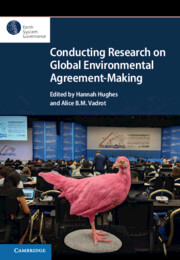Book contents
- Conducting Research on Global Environmental Agreement-Making
- Series page
- Conducting Research on Global Environmental Agreement-Making
- Copyright page
- Dedication
- Contents
- Figures, Tables and Boxes
- Contributors
- Preface
- Acknowledgements
- Abbreviations
- 1 Introduction
- Part I Developing a Methodology
- 2 Starting
- 3 Frameworks
- 4 Concepts
- 5 Stakes
- Part II Navigating Sites
- Part III Collecting and Analysing Data
- Part IV Implementing and Adapting
- Index
- References
4 - Concepts
Selecting, Applying and Innovating Concepts
from Part I - Developing a Methodology
Published online by Cambridge University Press: 07 August 2023
- Conducting Research on Global Environmental Agreement-Making
- Series page
- Conducting Research on Global Environmental Agreement-Making
- Copyright page
- Dedication
- Contents
- Figures, Tables and Boxes
- Contributors
- Preface
- Acknowledgements
- Abbreviations
- 1 Introduction
- Part I Developing a Methodology
- 2 Starting
- 3 Frameworks
- 4 Concepts
- 5 Stakes
- Part II Navigating Sites
- Part III Collecting and Analysing Data
- Part IV Implementing and Adapting
- Index
- References
Summary
In this chapter we explore how to identify and select concepts from the work of political theorists, using Pierre Boudieu, Michele Foucault, and Jacques Lacan as examples. Starting with Foucault’s notion of discourse, we explore how scholars of environmental politics have adapted this term to develop an analytical framework that enables them to address their research puzzle and sites of study. We then use our study of IPCC and IPBES to recount how the scholarship of Bourdieu and Foucault has informed our individual study and how adopting key concepts from these theorists has enabled us to understand and explain the power asymmetries observed during intergovernmental meetings. However, there may come a point when the concepts adopted and applied, and the analytical approach developed from these, no longer provide adequate explanations for the observations made, and this may signal the need for combining different approaches or developing new concepts, as explored through the weighted concept. At the same time, the chapter reflects on why as a research community we are attracted to particular theorists – often dead, white, French, men – and the limitations this choice has the potential to impose and reproduce on present observation and analysis of global environmental politics.
- Type
- Chapter
- Information
- Publisher: Cambridge University PressPrint publication year: 2023
References
Further Reading
References
- 1
- Cited by

